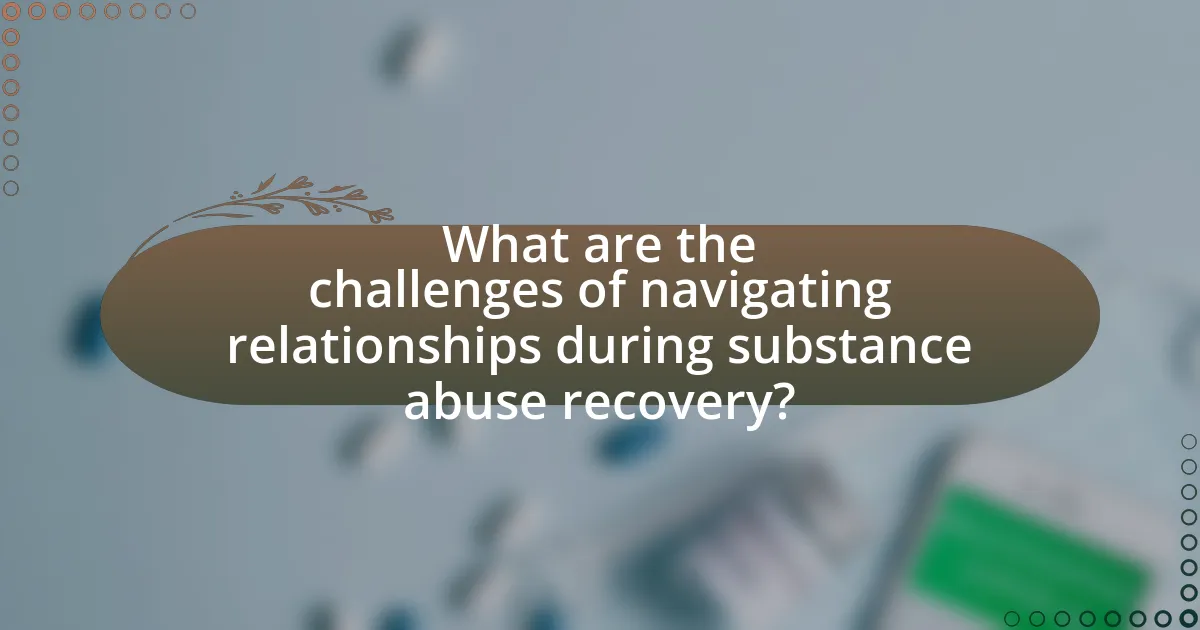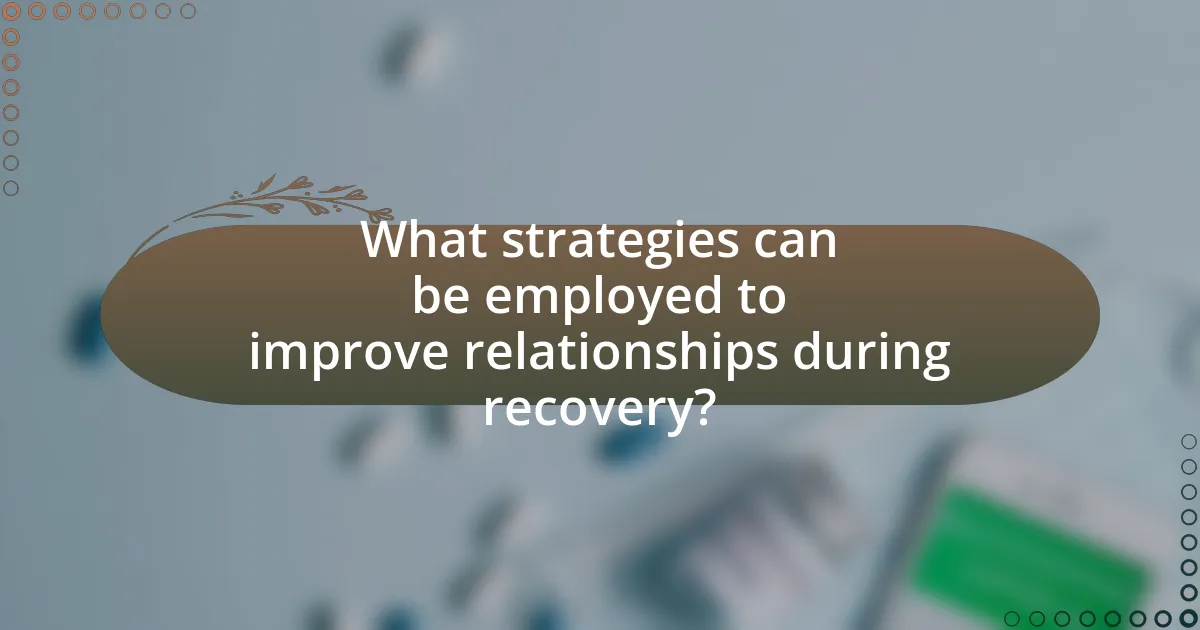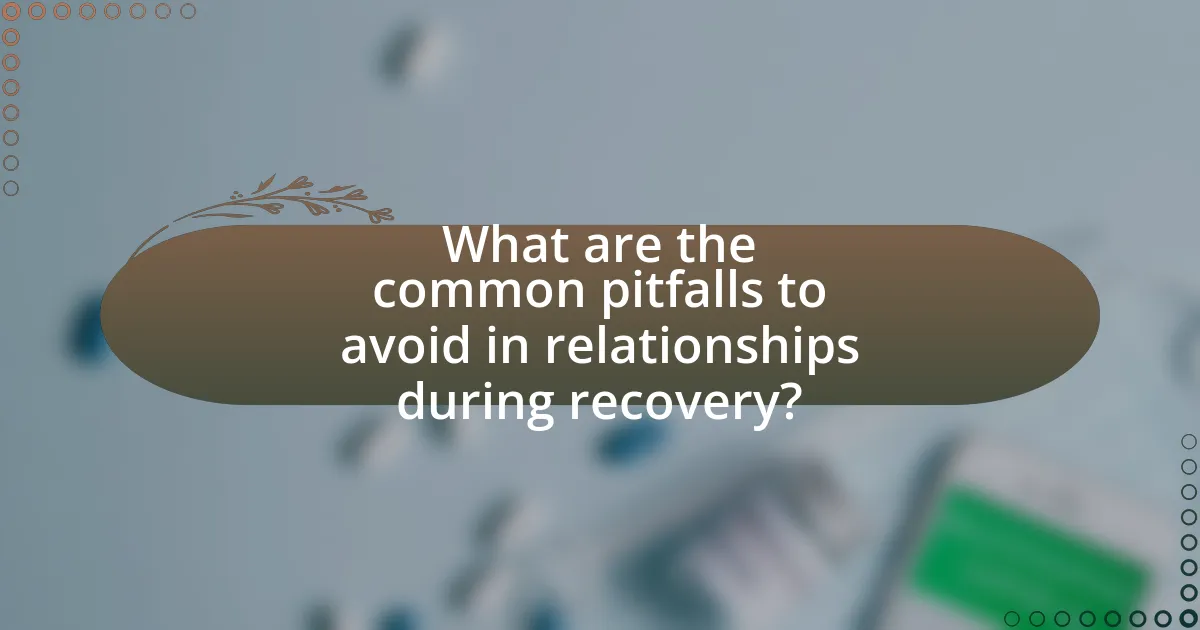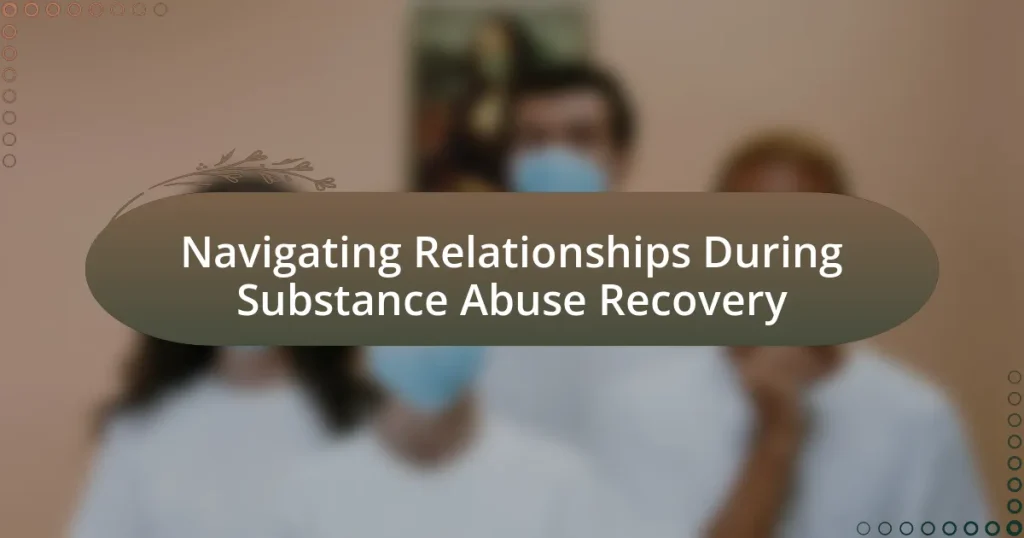Navigating relationships during substance abuse recovery involves significant challenges such as trust issues, communication barriers, and the risk of relapse. Substance abuse negatively impacts personal relationships by fostering mistrust and emotional distance, often leading to increased conflict. Effective communication and support from relationships are crucial for recovery, as they provide emotional stability and accountability. Strategies to improve relationships include open communication, setting boundaries, and engaging in shared activities, while avoiding pitfalls like codependency and unrealistic expectations is essential for maintaining healthy dynamics. Resources such as counseling and support groups are available to assist individuals in rebuilding trust and connection in their relationships during recovery.

What are the challenges of navigating relationships during substance abuse recovery?
Navigating relationships during substance abuse recovery presents significant challenges, including trust issues, communication barriers, and the potential for relapse. Individuals in recovery often struggle to rebuild trust with family and friends who may have been hurt by past behaviors associated with substance use. This lack of trust can lead to misunderstandings and conflict, complicating interactions. Additionally, effective communication becomes difficult as individuals may feel vulnerable discussing their recovery journey, leading to isolation. The presence of triggers in social situations can also pose a risk, as environments or people associated with past substance use may provoke cravings, increasing the likelihood of relapse. These challenges highlight the need for support systems and open dialogue to foster healthier relationships during recovery.
How does substance abuse impact personal relationships?
Substance abuse significantly deteriorates personal relationships by fostering mistrust, communication breakdown, and emotional distance. Individuals struggling with substance abuse often prioritize their addiction over their relationships, leading to neglect of responsibilities and emotional needs. This behavior can result in partners, family members, and friends feeling abandoned or betrayed, which further exacerbates conflicts and misunderstandings. Research indicates that approximately 40% of individuals with substance use disorders experience relationship problems, highlighting the pervasive impact of addiction on interpersonal dynamics.
What specific relationship dynamics are affected by substance abuse?
Substance abuse significantly affects relationship dynamics, particularly through increased conflict, diminished trust, and altered communication patterns. For instance, individuals struggling with addiction often prioritize substance use over relationships, leading to neglect and emotional distance. This behavior can result in heightened arguments and resentment among partners, as well as a breakdown in effective communication. Research indicates that approximately 70% of couples dealing with substance abuse report increased conflict and dissatisfaction in their relationships. Furthermore, trust is frequently eroded, as partners may lie or hide their substance use, creating a cycle of betrayal and mistrust. These dynamics can ultimately lead to relationship dissolution if not addressed through recovery efforts.
How do family roles change during recovery?
Family roles often shift significantly during recovery from substance abuse, as members adapt to new dynamics and responsibilities. For instance, a family member who previously enabled substance use may take on a more supportive role, encouraging healthy behaviors and fostering accountability. Additionally, individuals in recovery may assume greater responsibility for their actions, leading to a redistribution of household duties and emotional support roles. Research indicates that these changes can enhance family cohesion and improve overall recovery outcomes, as families learn to communicate more effectively and establish healthier boundaries.
Why is support from relationships crucial during recovery?
Support from relationships is crucial during recovery because it provides emotional stability, accountability, and encouragement. Emotional support from friends and family can reduce feelings of isolation and anxiety, which are common during recovery. Research indicates that individuals with strong social support networks are more likely to maintain sobriety; for instance, a study published in the Journal of Substance Abuse Treatment found that social support significantly predicts positive recovery outcomes. Furthermore, relationships can offer practical assistance, such as helping individuals avoid triggers and providing a safe environment, which is essential for successful recovery.
What types of support can relationships provide during recovery?
Relationships can provide emotional, practical, and social support during recovery. Emotional support includes understanding, empathy, and encouragement from loved ones, which can enhance resilience and motivation. Practical support involves assistance with daily tasks, such as transportation to therapy or help with childcare, which can alleviate stress and allow individuals to focus on their recovery. Social support fosters a sense of belonging and reduces feelings of isolation, as engaging with supportive peers can reinforce positive behaviors and coping strategies. Research indicates that strong social networks are associated with better recovery outcomes, highlighting the importance of supportive relationships in the recovery process.
How can relationships hinder or help the recovery process?
Relationships can significantly influence the recovery process by either providing support or creating obstacles. Supportive relationships, such as those with family and friends who encourage sobriety, can enhance motivation and provide emotional stability, which is crucial for recovery. Conversely, relationships with individuals who engage in substance use or who are unsupportive can hinder recovery by increasing temptation and stress, leading to potential relapse. Research indicates that social support is a key factor in successful recovery outcomes, with studies showing that individuals with strong social networks are more likely to maintain sobriety over time.

What strategies can be employed to improve relationships during recovery?
To improve relationships during recovery, individuals can employ strategies such as open communication, setting boundaries, and engaging in shared activities. Open communication fosters trust and understanding, allowing individuals to express their feelings and needs clearly, which is essential for rebuilding connections. Setting boundaries helps to establish healthy dynamics, ensuring that both parties feel respected and safe in the relationship. Engaging in shared activities, such as attending support groups or participating in hobbies together, strengthens bonds and creates positive experiences that reinforce the relationship. Research indicates that these strategies can significantly enhance relationship satisfaction and support during recovery, as they promote emotional intimacy and mutual support.
How can effective communication be established in relationships during recovery?
Effective communication can be established in relationships during recovery by fostering openness, active listening, and empathy. Open communication allows individuals to express their feelings and concerns without fear of judgment, which is crucial in a recovery context where vulnerability is heightened. Active listening ensures that partners feel heard and understood, promoting a supportive environment. Empathy helps partners connect emotionally, validating each other’s experiences and struggles. Research indicates that effective communication is linked to better relationship satisfaction and recovery outcomes, as seen in studies published in the Journal of Substance Abuse Treatment, which highlight the importance of relational dynamics in recovery processes.
What are the key communication skills needed for healthy relationships?
The key communication skills needed for healthy relationships include active listening, assertiveness, empathy, and clarity. Active listening allows individuals to fully understand their partner’s perspective, fostering a sense of validation and connection. Assertiveness enables individuals to express their thoughts and feelings openly while respecting their partner’s views, which is crucial for conflict resolution. Empathy helps in recognizing and understanding the emotions of others, promoting compassion and support. Clarity ensures that messages are conveyed in a straightforward manner, reducing misunderstandings. Research indicates that effective communication significantly enhances relationship satisfaction and stability, particularly in challenging contexts such as substance abuse recovery, where clear and supportive dialogue is essential for rebuilding trust and connection.
How can active listening improve relationship dynamics?
Active listening can significantly improve relationship dynamics by fostering understanding and empathy between individuals. When one partner actively listens, they validate the other’s feelings and perspectives, which can lead to enhanced emotional connection and trust. Research indicates that effective communication, including active listening, is crucial in relationships, particularly during challenging times such as substance abuse recovery. A study published in the Journal of Substance Abuse Treatment found that couples who practiced active listening reported higher relationship satisfaction and better coping mechanisms during recovery. This demonstrates that active listening not only enhances communication but also strengthens the overall relationship by creating a supportive environment conducive to healing and growth.
What role does setting boundaries play in recovery?
Setting boundaries plays a crucial role in recovery by establishing clear limits that protect an individual’s emotional and physical well-being. These boundaries help individuals in recovery to prioritize their needs, reduce stress, and avoid triggers that may lead to relapse. Research indicates that individuals who effectively set and maintain boundaries are more likely to experience sustained recovery outcomes, as they create a supportive environment that fosters personal growth and accountability. For instance, a study published in the Journal of Substance Abuse Treatment found that participants who practiced boundary-setting reported lower levels of anxiety and higher levels of self-efficacy, which are essential for long-term recovery success.
How can individuals establish healthy boundaries with loved ones?
Individuals can establish healthy boundaries with loved ones by clearly communicating their needs and limits. Effective communication involves expressing feelings honestly and assertively, which helps loved ones understand what behaviors are acceptable and which are not. Research indicates that setting boundaries can reduce stress and improve relationships, as it fosters mutual respect and understanding. For instance, a study published in the Journal of Substance Abuse Treatment highlights that individuals in recovery who set clear boundaries experience better emotional well-being and stronger support systems.
What are the consequences of not setting boundaries during recovery?
Not setting boundaries during recovery can lead to increased risk of relapse and hinder personal growth. Without clear boundaries, individuals may find themselves in toxic relationships that can trigger cravings or negative behaviors associated with substance use. Research indicates that maintaining boundaries is crucial for emotional well-being; for instance, a study published in the Journal of Substance Abuse Treatment highlights that individuals who establish and enforce personal boundaries experience lower rates of relapse and improved mental health outcomes. Additionally, failing to set boundaries can result in feelings of overwhelm and stress, further complicating the recovery process.

What are the common pitfalls to avoid in relationships during recovery?
Common pitfalls to avoid in relationships during recovery include codependency, unrealistic expectations, and lack of communication. Codependency can lead to unhealthy dynamics where one partner enables the other’s substance use or recovery struggles, undermining both individuals’ progress. Unrealistic expectations, such as expecting immediate trust or emotional stability, can create pressure and disappointment, hindering relationship growth. Lack of communication often results in misunderstandings and unresolved conflicts, which can exacerbate stress and relapse risks. Research indicates that effective communication and setting realistic goals are crucial for maintaining healthy relationships during recovery, as highlighted in studies by the Substance Abuse and Mental Health Services Administration.
How can codependency affect recovery and relationships?
Codependency can significantly hinder recovery and damage relationships by fostering unhealthy dynamics where one partner’s needs overshadow the other’s. In recovery, individuals may struggle to establish personal boundaries, leading to enabling behaviors that perpetuate substance abuse rather than support sobriety. Research indicates that codependent relationships often involve a cycle of dependency that can exacerbate mental health issues, making it difficult for individuals to focus on their recovery goals. For instance, a study published in the Journal of Substance Abuse Treatment found that individuals in codependent relationships were less likely to maintain long-term sobriety compared to those in healthier partnerships. This evidence underscores the detrimental impact of codependency on both recovery outcomes and relational health.
What signs indicate codependency in relationships?
Signs that indicate codependency in relationships include an excessive reliance on a partner for emotional support, a lack of personal boundaries, and a tendency to prioritize the partner’s needs over one’s own. Individuals exhibiting codependent behaviors often feel responsible for their partner’s feelings and actions, leading to feelings of guilt when asserting their own needs. Additionally, they may experience anxiety when separated from their partner and struggle with low self-esteem, often seeking validation through the relationship. These behaviors can hinder personal growth and create an unhealthy dynamic, particularly in the context of substance abuse recovery, where maintaining individual autonomy is crucial for healing.
How can one break free from codependent patterns?
To break free from codependent patterns, one must establish healthy boundaries and prioritize self-care. This involves recognizing and addressing personal needs, which can be achieved through self-reflection and therapy. Research indicates that individuals who engage in cognitive-behavioral therapy (CBT) show significant improvement in managing codependency, as CBT helps in identifying and changing negative thought patterns. Additionally, support groups such as Codependents Anonymous provide community and resources for individuals seeking to change these patterns, reinforcing the importance of social support in recovery.
What are the risks of returning to old relationships during recovery?
Returning to old relationships during recovery poses significant risks, including the potential for relapse, emotional distress, and the reactivation of unhealthy patterns. Individuals in recovery may find themselves influenced by the behaviors and environments associated with past relationships, which can undermine their progress. Research indicates that social support from positive relationships is crucial for recovery, while negative influences can lead to increased stress and temptation to revert to substance use. A study published in the Journal of Substance Abuse Treatment highlights that maintaining distance from previous social circles linked to substance use is essential for sustaining recovery.
How can individuals assess the health of their relationships post-recovery?
Individuals can assess the health of their relationships post-recovery by evaluating communication patterns, emotional support, and trust levels. Effective communication is crucial; individuals should observe whether conversations are open and honest, as research indicates that healthy communication correlates with relationship satisfaction. Emotional support can be assessed by determining if partners provide encouragement and understanding during challenging times, which is essential for maintaining strong connections. Trust levels can be evaluated by reflecting on feelings of safety and reliability within the relationship, as studies show that trust is a foundational element in successful relationships. Regularly checking in with oneself and the partner about these aspects can provide insights into the relationship’s overall health.
What steps can be taken to safely reconnect with past relationships?
To safely reconnect with past relationships during substance abuse recovery, individuals should first assess their readiness for such interactions. This involves evaluating emotional stability and ensuring that they have developed coping strategies to handle potential triggers. Next, initiating contact should be done gradually, starting with low-pressure communication methods such as text messages or social media, allowing for a controlled environment.
Additionally, setting clear boundaries is crucial; individuals should communicate their recovery journey and the importance of sobriety to their past connections. Engaging in supportive environments, such as recovery groups, can also provide a safe space for discussing past relationships and gaining insights from others who have navigated similar situations.
Research indicates that maintaining healthy relationships can significantly enhance recovery outcomes, as supportive social networks contribute to emotional well-being (Substance Abuse and Mental Health Services Administration, 2019). Therefore, by following these steps, individuals can effectively and safely reconnect with past relationships while prioritizing their recovery journey.
What practical tips can enhance relationships during substance abuse recovery?
Open communication is essential for enhancing relationships during substance abuse recovery. Engaging in honest discussions about feelings, challenges, and progress fosters trust and understanding among individuals involved. Setting boundaries is another practical tip; it helps define acceptable behaviors and expectations, which can prevent misunderstandings and conflicts. Additionally, participating in support groups together can strengthen bonds, as shared experiences create a sense of community and mutual support. Regularly expressing appreciation and gratitude towards each other reinforces positive interactions and emotional connections. Research indicates that strong social support significantly improves recovery outcomes, highlighting the importance of nurturing relationships during this critical time.
How can individuals cultivate new, supportive relationships?
Individuals can cultivate new, supportive relationships by actively engaging in community activities and support groups. Participation in local events, workshops, or recovery programs fosters connections with like-minded individuals who share similar experiences and goals. Research indicates that social support is crucial for recovery; a study published in the Journal of Substance Abuse Treatment found that individuals with strong social networks are more likely to maintain sobriety. By seeking out environments that promote interaction and understanding, individuals can build meaningful relationships that enhance their recovery journey.
What resources are available for relationship support during recovery?
Resources available for relationship support during recovery include counseling services, support groups, and educational materials. Counseling services, such as couples therapy or individual therapy, provide professional guidance to navigate relationship challenges during recovery. Support groups, like Al-Anon or Nar-Anon, offer peer support for families and friends of individuals in recovery, fostering understanding and shared experiences. Educational materials, including books and online resources, help individuals and couples learn about the dynamics of relationships affected by substance abuse, promoting healthier communication and coping strategies. These resources are essential for rebuilding trust and connection in relationships impacted by addiction.
